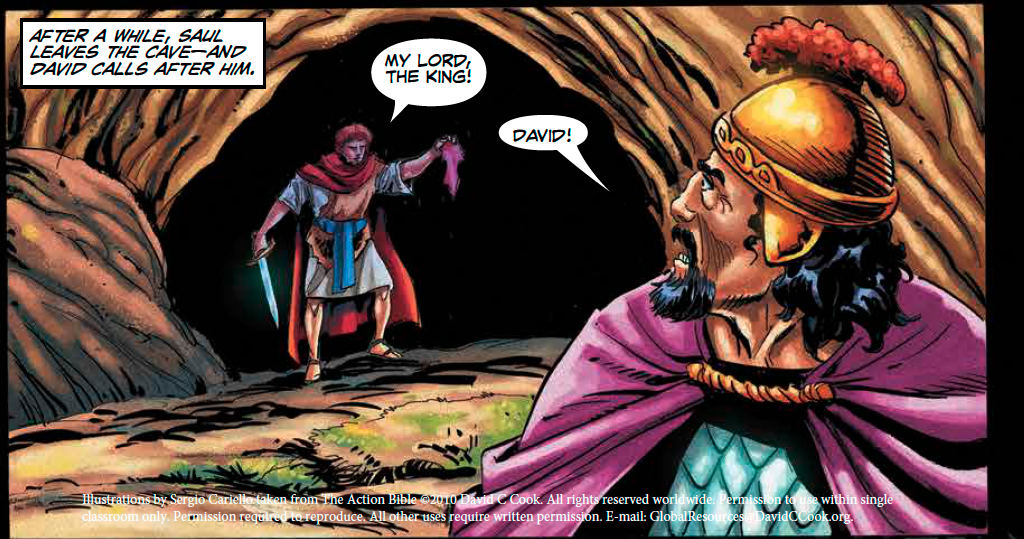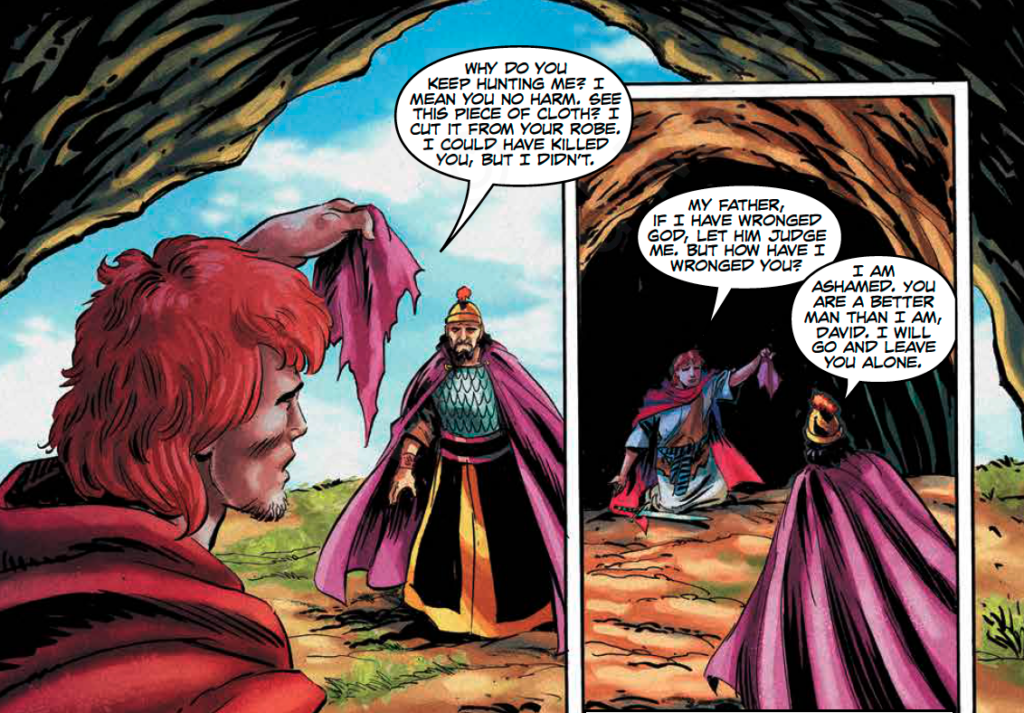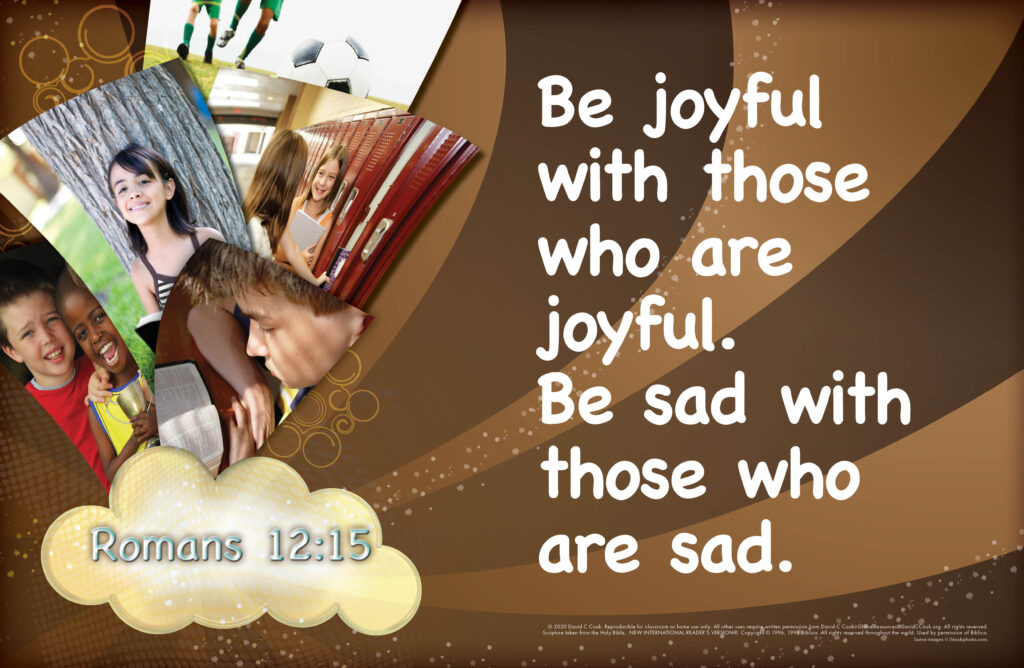During the lesson, the information for you to know is written in regular type, and what we suggest speaking or reading aloud to children is in bold. All resources for this lesson, including the Teacher Guide, Student Page, Family Connection Card, and other resources can be downloaded in a ZIP file by clicking on the following link:
In some lessons you will find "resource articles." These are articles written by experts from around the world to help equip you for your work with children and adolescents. Share them with parents or guardians if you consider it appropriate.
Love is patient. Love is kind. It does not want what belongs to others. It does not brag. It is not proud.
1 Corinthians 13:4
God is kind and patient. His love is amazing! You can show God’s love to others through your actions and words. Instead of saying or doing something that could be hurtful to someone else, you can choose to think before you do something you will later regret. Think of a time when you needed to be patient with someone but your response was hurtful to him. Perhaps a family member frustrated you by asking for help with something. What did he do to make you upset? How did you respond?
You know it is wrong to hurt others, ourselves, or other people’s property. Yet, knowing these things are wrong does not mean that it is easy to prevent hurt in these areas. When you do something unkind to someone, not only can it hurt that person, it can also hurt you. God wants you to show love to others. When you get into a situation that is difficult, be patient and take a moment to think. Remember to use gentle words and actions. By taking the time and care not to hurt the person you are dealing with, you will feel good about how you handled the situation. Know that God will give you the strength you need to step back, breathe, and make a choice that does not hurt anyone or anything.
Encourage families to be aware of the 3 Do Not rules and observe when family members follow them. Tell families the 3 rules: do not hurt yourself, do not hurt others, and do not hurt property. Explain that these rules apply to both actions and words.
Teacher Tip: If possible, email or text the Family Connection Card to the families of your students.
Greet the children as they come into class. Show them an emotion on your face and ask them to tell you how they think you feel.
The last time we met, we talked about recognizing emotions. Think about the emotion you felt when you got up this morning. Were you happy, sad, joyful, or did you feel another emotion? Show me with your face what emotion you felt this morning.
Respond to the emotions the children show.
Wow! It looks like you all felt a lot of different emotions this morning. Many of you felt happy, some of you felt sad, and others felt (other emotions shown by the students).
Let’s play a game to show the different ways we react to our emotions. I will give you a situation and many possible reactions. For each reaction, I will point to a different area of the teaching space. When I raise my hand, walk quickly to the area representing the reaction you might have.
Situation 1: I lost an important assignment for school.
Reaction 1: I am scared of disappointing my teacher. I calm myself down and try to redo the homework quickly.
Reaction 2: I am angry with myself. I stomp around and yell at my brother.
Reaction 3: I feel hopeless. I cry and pinch myself in punishment.
Reaction 4: I feel frustrated. I kick a table leg and something falls and breaks.
Situation 2: My sister died yesterday.
Reaction 1: I tear apart her favourite thing because I am angry she left me.
Reaction 2: I cry until my stomach hurts and I get sick.
Reaction 3: I talk with my family about how I feel.
Reaction 4: I avoid being close to others in my family because I do not want to get hurt again.
Have the children sit down for the lesson.
We can all have different emotions at different times. We can be happy. We can be joyful. We can be sad. We can be angry. We can all react differently to our emotions too. Some emotions make us feel good and some make us feel bad. Today we will learn 3 rules that will help us deal with strong emotions in healthy ways.
When we are angry or have other strong emotions, we sometimes do things that are not good for anyone. A strong emotion can sometimes make us feel out of control. When we are out of control, we can react in ways that are not good. This is not what God wants for us. To help us make good choices when we have strong emotions, we will learn 3 important rules.
Pause and have the children repeat the 3 rules after you.
Children might say: fighting, keeping emotions inside instead of expressing them, denying what they are feeling, or other things.
Children might say: calling people bad names, pushing, scratching, hitting, kicking, making a mean face at someone, and telling lies.
Children might say: tearing, breaking, or destroying something.
We will talk about these Do Not rules as we read about someone in the Bible who had to deal with strong emotions.
David was a good man who loved God. In a true story from the Bible, David did not let his emotions lead him to disobey God. David was a soldier in King Saul’s army, and the king really liked him. The king asked David to come to the palace to play beautiful music for him. After a while, King Saul became jealous and angry with David. Saul was so angry that he started chasing David to attack him.
David ran to another city to hide from the angry king. Saul brought soldiers with him to look for David. Saul wanted to hurt him! David worried that Saul would also destroy the whole city.
Allow 1–2 children to respond.
That is right! The king could have broken 2 of the Do Not rules. He wanted to hurt David and possibly the city. A city is property.
It is not kind. God wants us to treat others in the same way we want to be treated.
It does not belong to us. It also shows that our emotions are out of control. We do not honour God when our emotions are out of control.
If Saul had destroyed the city, the people who lived there would have been hurt and homeless.
King Saul let his emotions control his actions. He became so angry that he wanted to kill David. Remember, King Saul liked David at first. The king loved to hear David play beautiful music on his harp.
Allow children to respond. Discuss any of the following emotions: hurt, sad, angry, scared, or a mixture of them.
Optional: If possible, share the Action Bible pictures as you teach.

Because he did not want the king to hurt anyone, David left the city and hid in a cave. One day, King Saul came into the cave. David was at the back of the cave with some men who were ready to fight with Saul. Some of David’s men wanted to kill the king. But David knew he should not kill the king. David let Saul go without hurting him. Saul left the cave and David followed to talk to him about everything that had happened.
Optional: If possible, share the Action Bible pictures as you teach.

David asked what wrong he had done to King Saul and why he was chasing him. Saul knew David could have easily killed him, but he had not hurt him. Listen to King Saul’s response:
Read these verses directly from your Bible.
“You are a better person than I am,” he said. “You have treated me well. But I’ve treated you badly. May the Lord reward you with many good things. May he do it because of the way you treated me today.”
1 Samuel 24:17, 19b
David followed our rule about not hurting others, and Saul knew this. David asked God to judge which of them had done something wrong. David also let God decide what Saul’s punishment should be for chasing him and trying to kill him. By choosing not to fight Saul, David also made sure he would not hurt himself. David shows us that even when other people are not kind to us, we can choose not to hurt others.
When David chose not to hurt King Saul, he was showing respect. To respect someone is to do kind things to that person. This includes using kind words as well as showing kind and gentle actions toward others.
We all have strong emotions at times that make us want to shout or hit something or hurt someone. But those things do not honour God and they will not help us manage our strong emotions. Here are some healthy ways to deal with strong emotions
1. Calm down. When you give yourself a little time to calm down, you can control how you react to emotions that are difficult to manage. Once you are calm, you can decide how to react in a healthy way. Here are 2 ideas to help you calm down:
Take 3 deep breaths. Slowly count to 3 as you breathe in. Then breathe out to the count of 3. Practice with me. Breathe in, 1, 2, 3. Breathe out, 1, 2, 3.
You can also count to 10 slowly. Let’s practice. 1, 2, 3, 4, 5, 6, 7, 8, 9, 10.
2. Respond with kindness. For example, if someone says something mean, you can say something nice to her. You will feel better knowing you did not do anything to hurt anyone or anything. The person who caused the hurt might even be thankful for your reaction, just like Saul was thankful for David’s reaction of kindness in today’s story.
3. Talk with a trusted adult about what you are feeling and why. Sometimes our angry acts come because we do not understand what is making us angry. By talking about the problem, we can keep ourselves from hurting others.
4. Ask God for help. This is the most important step. God loves you. He knows when you are having strong emotions about something. He knows when you have been hurt or are angry. He cares for everything in your life. He wants you to go to Him with your emotions and problems. Listen to this verse:
Trust in him at all times, you people. Tell him all your troubles. God is our place of safety.
Psalm 62:8
We can trust God with everything we feel in the good times and the difficult times because He loves us.
Now you will practice what you have learned today. I will give you a situation for each Do Not rule. For each situation, you will:
1. Tell me which rule was broken.
2. Without touching anything or anyone, show me how you might react if you did not know the 3 Do Not rules. Maybe you would stomp your feet, shake your fists, throw something, or do something else that is hurtful.
3. Find a healthy way to handle your emotions.
If your students do not remember the 3 Do Not rules when you ask them which rule was broken, list the rules and guide the children’s responses.
Situation 1: Your friend had something really bad happen to him, so he told you he did not want to be your friend anymore.
Do not hurt others.
Pause briefly to allow students to show their reactions.
Children might breathe slowly, count to 10, pray and ask God for help, or respond to the friend with kindness instead of anger.
Situation 2: Your younger sister wanted to use your new pencil. She was angry at you for not sharing it with her. She grabbed it out of your hand and broke it!
Do not hurt property.
Pause briefly to allow students to show their reactions.
Children might breathe slowly, count to 10, pray and ask God for help, or respond to the sister with kindness instead of anger.
Instead of hurting your sister, you could stop and calm down. You could choose to talk with a trusted adult about how to handle your strong emotion in a good way. Also, you can always talk with God about what you are feeling. He will help you find a healthy way to respond.
While it is not always easy to handle strong emotions in good ways, you are doing what God wants you to do. By not hurting ourselves, others, or property, we will not feel bad later about how we react to our strong emotions.
Optional: If you are using the Student Pages, give the children 5 minutes to cross out the Do Not things they find in the picture.

Remember, before you can control your emotions, you must recognize them.
If possible, show the Memory Verse poster. Then review the memory verse with the rhythm. Repeat the verse and rhythm with the children at least 3 times.
Be joyful with those who are joyful. Be sad with those who are sad.
Romans 12:15

End class by speaking this blessing, based on Psalm 62:8, over the children.
Blessing: May you know that you can trust God at all times. You can always tell Him everything you are feeling. He is a safe place for your strong emotions.
If you have time, share this song with your children to celebrate how great God is!
Life on Life ©2020 David C Cook. Reproducible for home or classroom use only. All other uses require written permission from David C Cook [email protected]. All rights reserved.